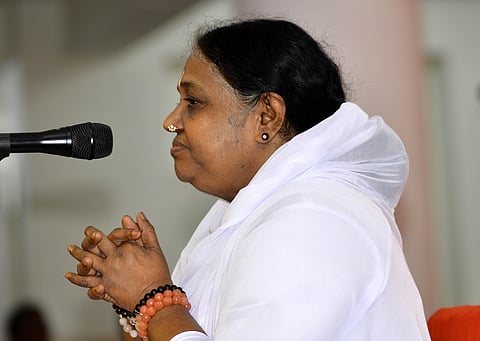

Children, there are different conceptions of God in different religions. In truth, God has no name or form. It is, however, not easy to worship the formless and attribute-less God. In order to cultivate devotion and concentration, we must turn to some form of God. Every devotee has the right to worship a form of divinity that he or she likes. This is ishta-devata upasana, worship of the form of God one likes.
Like the ocean tide that rises because of the moon’s gravitational pull, God assumes many forms in response to the devotee’s ardent desire. If God is conceived of as Lord Shiva, He will appear in that form. If God is worshipped as Devi, He will manifest as the Goddess.
We can imagine any form, but we must have faith in that form. If we worship our ishta-devata with the attitude that he or she is the Supreme Self, our worship will culminate in a vision of the Self. Form is
a ladder. Just as shadows disappear at noon, the form merges into the formless when concentration ripens in meditation.
Instead of worshipping different deities, we must worship our ishta-devata, regarding him or her as the Supreme. We must regard other forms of God as different aspects of our ishta-devata. If we worship different deities at different times, we will not gain the fruits of our worship so soon. Our mind must become established in the form of and mantra associated with our ishta-devata. If we try to dig a well, there is no point in digging small holes in many different places. We will find water only if we dig deep in one place. We must worship our one ishta-devata exclusively. This spiritual principle is reflected in the practice of Sabarimala pilgrims calling out, ‘Swamiye Saranam Ayyappa (Grant us refuge, O Lord Ayyappa)’, no matter which temple they visit.
Only if we love our ishta-devata will his or her form become clear in our heart. We must pray constantly for a vision of our beloved deity. A devotee’s attitude to God ought to be the same as that of a lover for his beloved. If he has seen his beloved in a blue sari, every time he sees the blue colour, he will be reminded of her. Whether asleep or awake, he will be thinking of her alone. From the moment he wakes up, his mind will dwell solely on her. While brushing his teeth or sipping his coffee, he will be thinking about what she is doing at this moment.
We must have this same absorbing and all-consuming love for our ishta-devata. We must become incapable of thinking of anyone or anything other than him or her. Even bitter gourd loses its natural bitterness and becomes sweet if immersed in sugar syrup for a long time. Similarly, by constantly meditating on and remembering his ishta-devata, the devotee becomes one with God.
The writer is a world-renowned spiritual leader and humanitarian
Instead of worshipping different deities, we must worship our ishta-devata, regarding him or her as
the Supreme, and other forms of God as different aspects of ishta-devata.